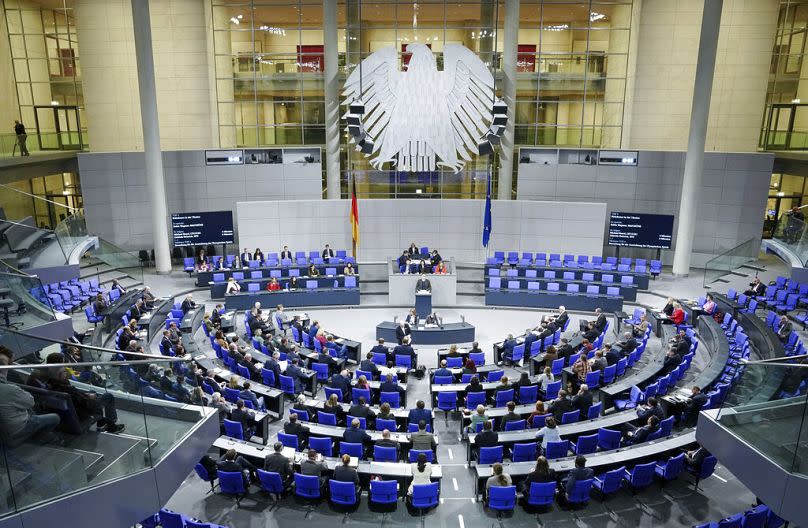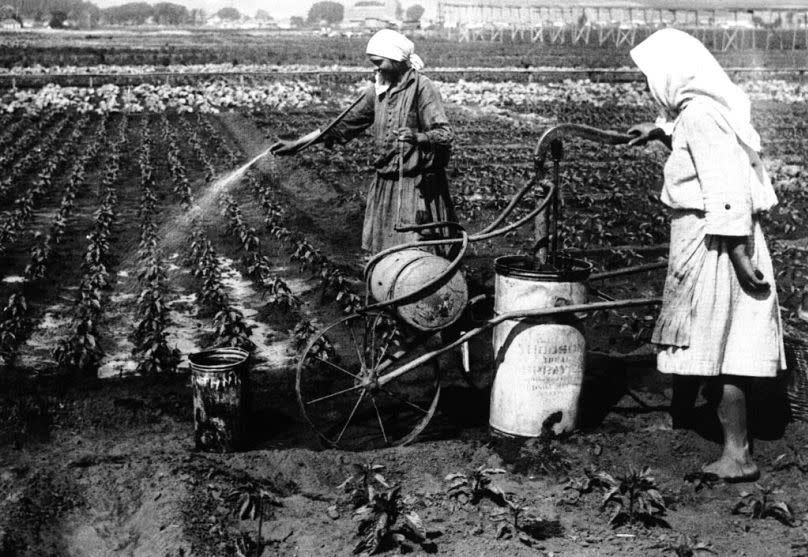European parliaments are recognising Ukraine's Soviet-era Holodomor famine as genocide. Why now?

Slovenia, France, Belgium and the UK are just some European countries whose parliaments have declared the Holodomor - a devastating 20th-century famine in Ukraine - a genocide.
Jani Prednik, a member of the Social Democrat party of Slovenia and one of the initiators of the resolution in the country's parliament, described the Holodomor as “one of the biggest humanitarian catastrophes and crimes against humanity of the 20th century.”
Pauline Latham, the Conservative MP who tabled the motion in the UK, said the Ukrainian famine in the early 1930s was caused by the forced confiscation of peasants' crops by the Soviets.
She also drew parallels with current events, where Russia seizes Ukrainian grain on occupied Ukrainian soil.
“That's why we have to assure the Ukrainian authorities and international order that the United Kingdom – at least the UK Parliament – will not turn a blind eye to war crimes and crimes against humanity,” Latham said.
Crimes of the Soviet Union specifically targeting Ukrainians have gained an increased interest ever since Russia's full-scale invasion of the country in February 2022.
As Russian President Vladimir Putin continues to deny ethnic Ukrainians a separate identity from Russia, scholars, journalists and politicians across the continent are beginning to consider whether previous moments in history where Ukrainians were targeted should be given more consideration.
This year marks the 90th anniversary of the Holodomor.

Parliaments versus courts
However, legal experts worry that having parliaments declare something a genocide does not carry as much weight as when a court does it.
“Any parliament is free to, within the spirit of debate and deliberation, come up with any conclusions and statements that it wants to,” explained Iva Vukušić, a historian at Utrecht University in the Netherlands whose work focuses on war crimes prosecution.
The legal category of genocide did not exist until after World War II, when the world – as well as the legal profession – struggled to define the mass atrocities it inflicted on the continent.
The Holocaust is known as the genocide of the European Jews, and is often held up as a grim benchmark for how far countries can go in the destruction of another nation.
Genocide is the destruction of – or the intent to destroy – a community, whether in part or in whole, according to the Rome Statute of the International Criminal Court and the UN Genocide Convention.
While historians, writers, and lawyers may lean on each other when analysing certain events, their definition of genocide differs from that of a legal scholar.
“Any resolution passed by a parliament is a political and symbolic act of recognising events like the Holodomor, the Armenian Genocide and other historical injustices,” said Vukušić.
"They are not based on the same process and do not involve the same kind of in-depth investigation of evidence that a court would be engaging in."
Support for Russia drops in post-Soviet countries after Ukraine invasion
EU Parliament recognises Holodomor as genocide against Ukrainians
Why is recognising the Holodomor important?
The Ukrainian name for the brutal famine that took place between 1932-1933 is derived from the word “holod” for hunger and “moryty” for death or dying.
It stemmed from the Soviet Union's collectivisation of grain-producing areas – Ukraine then, as now, was a leading grain producer – and the application of a rationing system, leaving vast swathes of the population to starve.
Today, anyone who visits the Holodomor-Genocide Museum in Kyiv can see the images of skeletal, starving Ukrainians and read the shocking testimonies of populations having to resort to cannibalism to survive.
Yet, the event was barely known in the West for a long time. Its mention was technically banned in the Soviet Union until the liberalisation of the 1980s. Authorities were keen to quell Ukrainian testimonies that cast doubt on the socialist country’s grand collectivisation plans.
To this day, there is a long-ranging dispute about the exact number of people who died directly as a consequence of the Holodomor, with figures ranging from 3 to 20 million.
The crux of the debate today – and the reason why so many parliaments, including the EU’s legislative body, have passed resolutions calling it a genocide – is whether the man-made famine was an attempt by Soviet leader Joseph Stalin and others to silence pro-Ukrainian voices and cripple a more distinctive identity for Ukraine in the socialist state.

How are genocides prosecuted?
While no objective analyst would dispute the atrocities of the Holodomor, the way a historian perceives it is different from how a legal scholar analyses it.
“The issue of whether the Holodomor was a genocide or not has divided historians and academics for a long period of time,” explained Vukušić.
“While there is wide agreement that the famine was deliberate, the discussion about how it took place, and whether it was a consequence of certain policies or an attempt to destroy the Ukrainian nation as such is still discussed,” she continued.
Due to the fact that the events occurred about a century ago, none of the perpetrators or survivors of the events will ever see the inside of the courtroom.
In addition, the legal category of genocide did not exist at the time the events occurred.
“In law, generally speaking, there is an agreed principle that laws that were not on the books or did not exist at the time a crime was carried out can not be prosecuted,” said Vukušić.
“Applying laws retroactively would mean that in the future, someone can come up with a law that would prosecute something you are doing today and did not know was a crime,” she continued.
While laws tend to usually get more progressive and inclusive over time – homosexuality was illegal in the past – legalists argue that in case something currently considered legal now suddenly becomes punishable, say, if a country takes an illiberal or anti-democratic turn in the future, then courts would be able to imprison people for actions they committed when they were not illegal.
“If anything, applying laws retroactively would make it easy for someone to defend themselves against a charge, and say that a crime was not illegal at the time it was committed.”
In a hypothetical situation where Stalin or any of the perpetrators of the Holodomor were still alive and could be prosecuted, this means they could claim genocide did not exist as a legal category at the time and be acquitted.
They would not be acquitted of other crimes, but this still makes genocide a tricky charge - one that needs to be approached with great care.
“Genocide convictions are extraordinarily difficult to achieve and the prospect for justice is limited. This is why prosecuting the Holodomor, in a legal sense, is impossible and it now falls under the purview of historical crimes.”
'People always say never again': Ukraine's Jewish community marks Holocaust Memorial Day
Armenian film tells the inspiring story of genocide survivor, Aurora Mardiganian
Could Ukraine prosecute Russia for genocide in the future?
The reason why a genocide charge is so sensitive is because it was introduced as a way to characterise human evil – a malevolence that leads to millions dying due to their perceived ethnic background, religious beliefs or even political convictions.
The burden of evidence required for a successful conviction needs to meet the highest legal standards.
Of the estimated 46 genocides that are believed to have taken place between 1956 and 2016, only three have been legally classified as such: Rwanda in 1994, Bosnia in 1995 and Cambodia under the Pol Pot regime in the late 1970s.
Some have argued that because an acquittal – which in legalese only means that not enough evidence was presented to convince the court – is often used by perpetrators to maintain their innocence, most courts should stay away from genocide charges altogether.
However, due to Putin's rhetoric which some claim shows clear genocidal intent – through the denial of the existence of a Ukrainian identity – and the atrocities committed against Ukrainian civilians by the Russian military in places like Bucha and Irpin, there is talk of a possible genocide charge being launched.
Russia denies targeting civilians.
While Vukušić does not cast aside the possibility, there are many things Ukraine needs to consider beforehand.
“Of course, all of this depends on the outcome of the war. Many of the perpetrators are not going to be available to the Ukrainian prosecutors or the International Criminal Court, they will stay in Russia – especially high-level indictees like Putin,” she said.
Putin, who is facing an indictment from the ICC, “is not going to travel to Germany or any of the places where he might get arrested. Maybe in five years time or so, things get shaken up in Russia and there is an interest in sending him to the Hague – even as a part of a trade-off for other international diplomatic benefits – it could happen.”
Based on her experience and that of countless international law experts, she suggests that the top priority for Ukraine should be to collect evidence.
“Even wealthy countries with expansive legal systems can only handle so much at any given point,” she exclaimed.
“According to information I have, there are over 80,000 alleged cases of war crimes and other violations of international humanitarian law. Each one of those crimes needs to go through a lengthy process of investigation, but no system on earth is able to process that.”
There are many actors involved in evidence gathering and analysis in Ukraine besides the country’s institutions, and they feature prosecutors from ICC, investigators from several European countries such as France, Poland, and the Netherlands as well as civil society organisations.
Despite the best intentions of both international and local courts, political considerations have often impeded even the evident war criminals – such as Syrian leader Bashar al-Assad – from seeing the inside of a courtroom.
“Sadly Assad, who did not lose the war and stayed in power, is being even somewhat rehabilitated and readmitted in the Arab League and other fora – so that could also happen,” she said.
But if the facts about what is currently happening on the ground in Ukraine are well documented, “denialism of those crimes will be limited as much as possible.”
“In 30 years time, we want to have statements, information, and testimonies that people can analyse and write books about based on court records. There is going to be a need to tell the stories about what happened.”

